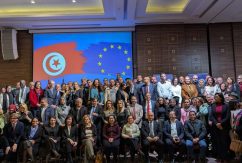Mogherini confirms EU’s commitment to accompany Tunisia and support its youth

On the occasion of the Tunisian week at the European Parliament, EU High Representative Federica Mogherini reaffirmed the EU’s willingness to fully support Tunisia in its democratic transition and to support the Government’s efforts for more socio-economic development, in particular through increased support in youth-related fields such as employment, education, research and student and youth mobility.
“Just after the 2011 revolution, the EU pledged its full support for the transition started by the Tunisian people, whom you represent here today … We have since decided together to set up a privileged partnership. A partnership continuously nourished by our exchanges at all levels,” said Mogherini, adding: “Today, I wish to reaffirm our commitment to continue to support your efforts on reforms – including public administration, justice, decentralisation and the fight against corruption, and much more.”
She recalled the actions taken by the European Union in order to translate this support into concrete action. “The European Union adopted at the end of 2016 a Communication detailing a series of ambitious measures in support of Tunisia, both financially and practically, and thus demonstrating the depth of our relationship with Tunisia. Through these actions, the EU shows that it’s always there for Tunisia. So we look forward to your success, and we want to support you fully in the face of the current challenges – as we know very well, there are several, economic, security, social and regional, starting from the crisis in Libya that concerns us directly as Tunisians and as Europeans, in exactly the same way.”
The High Representative also underlined the importance the EU attaches to the support of Tunisian youth. “Following my meeting with President [Béji Caïd Essebsi], during my visit to Tunis on 1 November 2016, we launched the EU-Tunisia Youth Partnership. And we are ready to fully support Tunisia in the preparation and implementation of a national strategy for youth … Our aim is to allow this great wealth – youth – to flourish.”
“We are now working on strengthened support in areas such as employment, education, research and student and youth mobility. We hope to establish a structured and inclusive dialogue on Tunisian youth, but above all with Tunisian youth, and predominantly to work to open channels for active participation of youth in the social and political life of the country,” she added.
Read more
Relations between the EU and Tunisia – Factsheet
Q&A: Supporting Tunisia’s transition: a strategic priority for the EU
EU Delegation to Tunisia – website and Facebook page





























 Syria
Syria 





